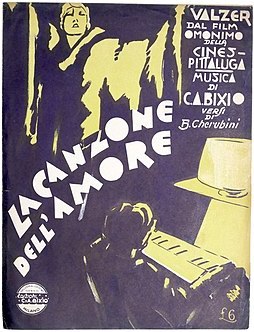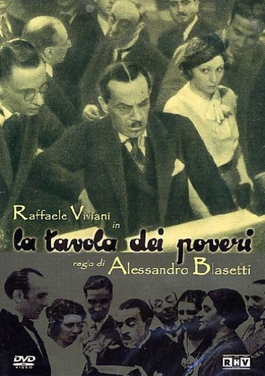Related Research Articles

The cinema of Italy comprises the films made within Italy or by Italian directors. Italy is one of the birthplaces of art cinema and the stylistic aspect of film has been one of the most important factors in the history of Italian film. As of 2018, Italian films have won 14 Academy Awards for Best Foreign Language Film as well as 12 Palmes d'Or, one Academy Award for Best Picture and many Golden Lions and Golden Bears.

Alessandro Blasetti was an Italian film director and screenwriter who influenced Italian neorealism with the film Quattro passi fra le nuvole. Blasetti was one of the leading figures in Italian cinema during the Fascist era. He is sometimes known as the "father of Italian cinema" because of his role in reviving the struggling industry in the late 1920s.

The Song of Love is a 1930 Italian romance film directed by Gennaro Righelli and starring Dria Paola, Isa Pola and Elio Steiner. It was the first Italian talking film. Alessandro Blasetti's film Resurrection was actually shot first, but delays meant that it was not released until 1931.

Full Speed is a 1934 Italian comedy film directed by Mario Mattoli and starring Vittorio De Sica, Milly and Camillo Pilotto. It was shot at the Cines Studios in Rome. The film's sets were designed by the art director Gastone Medin.
Lux Film was an Italian film distribution company founded by Riccardo Gualino in 1934.

The Table of the Poor is a 1932 Italian drama film directed by Alessandro Blasetti and starring Raffaele Viviani, Leda Gloria and Salvatore Costa. It was based on a play by Viviani set in Naples. It was shot at the Cines Studios in Rome. The film's sets were designed by Gastone Medin. It portrays the adventures of an impoverished Marquis who continues to lead a grand lifestyle.

Hollywood on the Tiber is a phrase used to describe the period in the 1950s and 1960s when the Italian capital of Rome emerged as a major location for international filmmaking attracting many foreign productions to the Cinecittà studios. By contrast to the native Italian film industry, these movies were made in English for global release. Although the primary markets for such films were American and British audiences, they enjoyed widespread popularity in other countries, including Italy.

Stefano Pittaluga was an Italian film producer, one of several figures who helped revive Italian film production in the late 1920s and early 1930s.

The Innkeeper is a 1944 Italian historical comedy film directed by Luigi Chiarini and starring Luisa Ferida, Armando Falconi and Osvaldo Valenti. The film is an adaptation of Carlo Goldoni's 1753 play The Mistress of the Inn, one of a number of times the work has been turned into films. It belongs to the movies of the calligrafismo style.
Your Money or Your Life is a 1932 Italian comedy film directed by Carlo Ludovico Bragaglia and starring Sergio Tofano, Rosetta Tofano and Luigi Almirante. It was made at the Cines Studios in Rome.

The Testimony is 1946 Italian crime film directed by Pietro Germi and starring Roldano Lupi, Marina Berti and Ernesto Almirante. It is one of several films regarded as an antecedent of the later giallo thrillers.

The Man with the Claw is a 1931 Italian mystery film directed by Nunzio Malasomma and starring Dria Paola, Carlo Fontana, and Elio Steiner. It was made at the Cines Studios in Rome with sets designed by the art director Daniele Crespi. The film is one of several regarded as a possible precursor to the later giallo genre. A separate German version The Paw was also produced.

The Società Italiana Cines is a film company specializing in production and distribution of films. The company was founded on 1 April 1906.
The Unione Cinematografica Italiana (UCI) was an Italian film production and distribution consortium of the silent era. Following the end of the First World War, a group of eleven leading Italian companies joined forces in a single conglomerate which would be better able to compete with rival films from America, Britain, France and Germany. The driving force behind UCI was Baron Alberto Fassini, who had previously headed the Cines studio.

Baron Alberto Fassini (1875–1942) was an Italian business tycoon and film producer. Fassini owned a large synthetic textile company, and was close to the regime of the dictator Benito Mussolini. He owned the Palazzo Tittoni where Mussolini lived from 1923 to 1929.
Scalera Film was an Italian film production and distribution company which operated between 1938 and 1950. It had strong backing from the Italian state, as the Fascist government of Benito Mussolini was keen to build up and centralise the Italian film industry. It was founded by the brothers Michele and Salvatore Scalera, and primarily based at the Scalera Studios in Rome. In 1943 during the German occupation of Rome, the studio was relocated to Venice in the Italian Social Republic as part of a planned Cinevillaggio film complex developed by Mussolini loyalists.
Lowered Sails is a 1931 Italian drama film directed by Anton Giulio Bragaglia and starring Dria Paola, Carlo Fontana and Umberto Guarracino.
Courtyard is a 1931 Italian drama film directed by Carlo Campogalliani and starring Augusto Contardi, Dria Paola and Ettore Petrolini. It was the director's first sound film, and was made after he returned from working in South America for several years.

Giallo is a 1933 Italian comedy thriller film directed by Mario Camerini and starring Assia Noris, Sandro Ruffini and Elio Steiner. It is based on the 1928 play The Man Who Changed His Name by Edgar Wallace in which a young wife begins to fear that her husband may in fact be an escaped murderer.

Itala Film was an Italian film production company.
